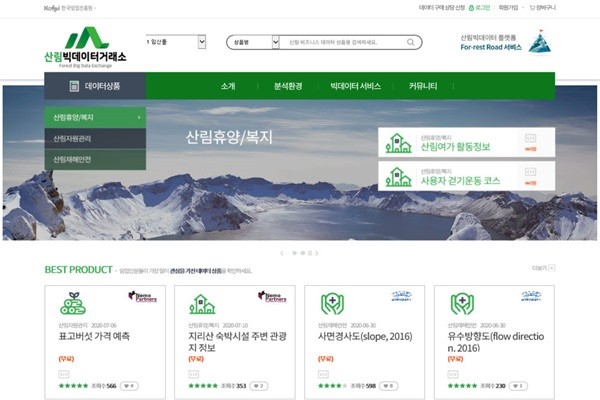The South Korean Government kicked off “Data Dam” project that is part of the larger Digital New Deal project that will push for job creation, future investment, and digital innovation through the South Korean economy simultaneously. “Big Data Platform and Center” is the core business of the Data Dam project. The goal of this business is to utilize collaboration between public and private sectors in order to create and open high-quality data so that the data ecosystem in South Korea can be innovated and competitive edge of South Korean companies can be raised.
Since the business was launched last year, more data has been supplied throughout different industries and new services based on data have been developed. Going forward, the Electronic Times will share characteristics of key big data platforms and share key successful stories and outlook the direction of big data platforms.
◊South Korea’s cultural big data platform shares information on various cultural facilities
“MarketC”, a cultural big data platform managed by Korea Culture Information Service Agency (KCISA) shares big data on different cultures, physical activities, tourism, books, arts, and media and creates innovative services.
“Culture Sphere”, which is the most popular service of MarketC, provides information on surrounding cultural facilities based on one’s location and it is based on local populations and data on cultural facilities in South Korea. It is converged with “digital power index (DPI)” supplied by DataMKTKorea and recommends most popular cultural facilities in the vicinity.
“K Food” is a service that provides information on restaurants and their menus. It is based on data established by REDTABLE that is participating in the MarketC platform through menu characteristics auto-tagging technology that is based on machine learning. K Food is able to recommend different food menu that is not provided by other restaurant recommending services. For example, it can recommend “food with lamb meat” or “spicy food” or “kid friendly restaurant” or “restaurant for Islamic friends”. Information on restaurants and their menus is available for free or at a cost to different industries through the MarketC website.
“Caredoc” is prime example that utilizes data from the MarketC platform and it provides information on accommodations nearby care facilities for families that visit care facilities. It vitalizes local business districts nearby care facilities and it also raises level of user satisfaction.
Related to COVID-19, data on different contact-free leisure activities will also be created this year. Such data will be based on information on camping sites and drive-thru stores. It is expected that such data will be for analysis on current trends on leisure activities that are changing due to COVID-19 and private services that recommend contact-free cultural activities.
“Just like “Culture Sphere” service that will be launched at the end of this year, we hope that more innovative services will come out as the private sector utilizes data distributed by the MarketC platform.” said Lee Kwon-soo who is the head of KCISA’s Cultural Big Data department.

◊Big data platform on forests accelerates development of new medicine development and disaster prediction services
South Korea’s big data platform on forests has an enormous data on the natural world as 90% of the wildlife in South Korea lives in forests.
Korea Forestry Promotion Institute (KOFPI) that manages the platform works with Infoboss to analyze data on genomes of living organisms. Korea Institute of Oriental Medicine (KIOM) establishes its own data on treatments and their effects based on data created by KOFPI and Infoboss. Medicines made with natural substances have less side effects and can reduce medicine development cost and time compared to new synthetic medicines.
The global market for medicines made with natural substances has been steadily growing at an average of 10% annually. The World Health Organization (WHO) estimates that the market will be worth $364 billion (423 trillion KRW) by 2023 after being worth $161 billion (187 trillion KRW) in 2011.
KOFPI is planning to introduce and provide “forest sphere index” that will include data on number of trees, distribution of trees, phytoncide generation amount, carbon dioxide absorption, reduction amount of fine dust, and parks and landscaping.
Forest product price trend prediction system will also be created in order to reduce potential damage for producers, processors, and consumers from fluctuation in forest products. Data on wholesale markets and local prices that KOFPI has been accumulating for 20 years will be analyzed through artificial intelligence-based machine learning. KOFPI is planning to provide a system that covers prediction in price trend, appropriate shipping time, effects of forest products, and analysis of trends on purchases by consumers by the end of this year.
KOFPI will also introduce a disaster prediction service using aerial photos with high resolution. Samah Aerial Survey takes 10cm high resolution aerial pictures of the entire country once a year. Although it was difficult to look for dead trees and illegal lumbering without a report, it is now possible to predict areas where there may be dead trees or illegal lumbering through data and artificial intelligence analysis. In 2019, Samah was able to differentiate 85% of dead trees through data. Data on high precision topographical information can also be utilized for autonomous driving in the future.
KOFPI is looking to converge its big data platform on forests with other industries and is working with Nemo Partners BA that creates converged data. It is working to provide consumer-centered data and is going to help beginners become data producers and distributors through a road show next month.
“Forests are greatly damaged by development projects.” said Jeon Sung-ki who is the head of KOFPI’s Forest Big Data department. “By utilizing big data on forests, we will be able to replace public values of forests as economic values and create businesses that will protect and utilize forests through such values.”